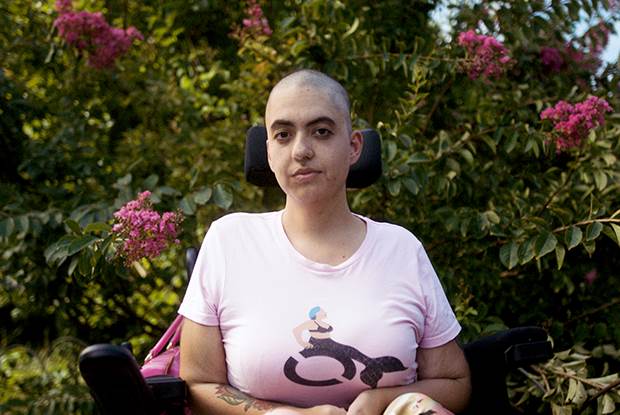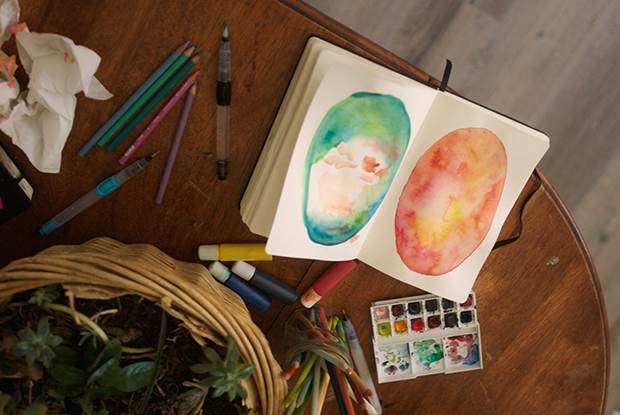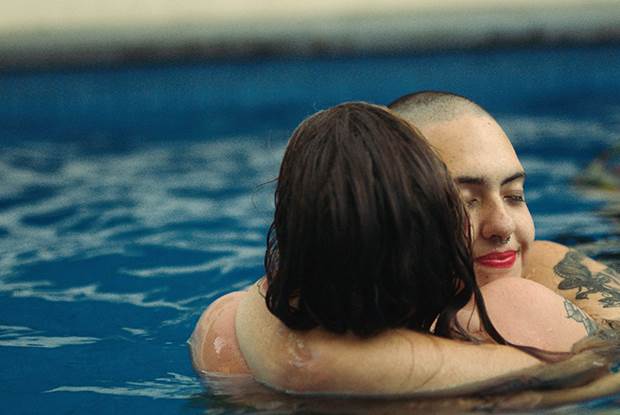how to be yourself with... ruby allegra
“You don't need to apologise for taking up space, or being proud of your body, or liking yourself in a society that thinks that you shouldn't like yourself.”
Created in collaboration with our mates at Levi's.
As far back as they can recall, Ruby Allegra has been obsessed with the colour pink. Their childhood wheelchair was pink; they'd ask their parents for pink food; and when their favourite t-shirt (which was white with pink ribbing) would go in the wash, they'd sit in front of the washing machine, patiently monitoring its spin cycle. Yep, it's safe to say that the Adelaide-based make-up artist and soon-to-be speech pathologist has a pretty passionate relationship with colour. They're also an online activist, encouraging folks from marginalised communities to feel proud of their body, gender and sexuality. Scroll down to read a few insights from Ruby about how to be yourself – and look flipping cool at the same time.

CHALLENGE NEGATIVE SELF-TALK Dating, romance and sex were things that I always assumed I was never going to experience and no one would be interested in experiencing with me. That was very much a result of internalised abelism – our society's idea that disabled people don't deserve certain things or aren't worthy of inclusion. It wasn't till I became acquainted with the disabled communities, body positive communities, self-love communities, the cripple punk movement and all of that sort of stuff that I began to question why I was having these negative thoughts, and to start to try and un-learn the way I'd been conditioned to think. I've gone from being quite ashamed of my body in some respects to owning it a bit more and being quite unapologetic. You don't need to apologise for taking up space, or being proud of your body, or liking yourself in a society that thinks that you shouldn't like yourself.
DRESS TO FEEL GOOD Because I have a physical disability, there's always going to be at least one person staring at me. That's something I am completely used to. So no matter what I wear, people aren't going to be focusing on that – they're going to be focusing on, “Who is that in the wheelchair?” I've got to the point where I'm like, “OK, if people aren't necessarily going to be focusing on what I'm wearing, then I can wear whatever the hell I want. People are going to be staring at me anyway; I might as well feel comfortable and confident while they're doing so.” That's helped me to become a lot more confident in experimenting with my hair and wearing less conventional make-up styles or colours. I have better things to put my energy into than being worried about whether or not someone's going to like my hairstyle.

EXPRESS YOURSELF Something that I like about fashion is being able to challenge what people assume about disability or body image or disability or sexuality. I enjoy challenging the stereotypes that say that your body type determines whether or not you're allowed to be fashionable; that fat people can't wear crop tops of tight-fitting clothes; that disabled people don't have style and can't enjoy what they look like. I also like being able to use fashion to illustrate to others that I'm queer and that I'm not cisgender. That's really important to me, because gender and sexuality aren't necessarily things that you can see. It's a sense of being, part of your identity, and something that you can express through your style.
TAKE THE PRESSURE DOWN There's a lot of focus in our society on gender binary: male and female. There's this idea that there's nothing in between, it's one or the other – whether you're a cis-gender woman or man or a trans-gender woman or man. That makes it difficult for people who are non-binary or gender-queer or gender-fluid or agender to find a sense of belonging and community and identity. It's similar with sexuality: there's this idea that you're either straight or you're gay. Again, that makes it difficult for people who aren't really sure where they fit, because they feel as though they need to be fitting into a specific box. That's why that representation is really important to help bring awareness to the fact that both sexuality and gender is a fluid thing; it doesn't have to be fixed.

BUILD A SUPPORT NETWORK Your support network could be yourself – establishing your own self-care routines and self-love and self-compassion – but it could also be friends, family, professionals, doctors or therapists that are supporting you in your experiences. It could also be the online community, people who have similar experiences or values to you. Having a sense of community is a very important part of being a human. We're social creatures. If someone doesn't have access to that, it's very difficult to experience a good quality of life. But it can just start with being kind to yourself, allowing yourself to have a day off work because you're exhausted and you need a mental health day, or having a second helping of dinner, because it was delicious and you really enjoyed it. Little things like that. It can start with you.
This rather uplifting article was brought to you by the nice types at Levi's, who chatted to Ruby as part of their I AM… short film series, celebrating equality and diversity among the LGBTQI+ community in Australia.
To see more of Ruby's rad style, pop past their Instagram.

